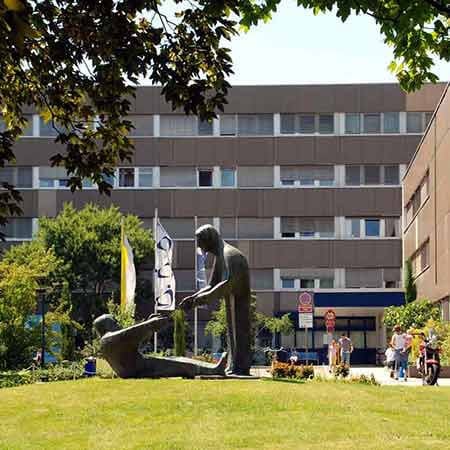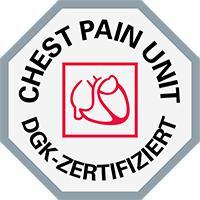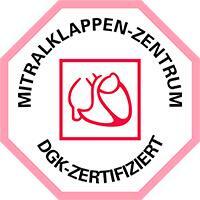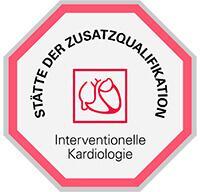Carotid sinus syndrome is a disease resulting from hypersensitivity of the receptors of the carotid sinus to mechanical stimulation. In elderly patients, reflex suppression of heart rate and/or vasodilation may result in abrupt loss of consciousness without preceding prodromal symptoms or manifest itself only by fatigue. The clinical diagnosis is confirmed by performing carotid sinus massage. Comprehensive therapy, which includes general recommendations, medication, and surgical correction, helps to reduce the risk of adverse effects in patients with carotid sinus syndrome.
Content
- Overview
- Mechanism of the syndrome development
- Causes of carotid sinus syndrome
- Symptoms of carotid sinus syndrome
- Diagnostics
- Treatment in Europe
- The cost of treatment in European hospitals
- Undergoing treatment in European hospitals with Booking Health
Overview
Although carotid sinus receptor function decreases with age, some patients have carotid hypersensitivity. In these cases, even a slight stimulation in the area of these receptors leads to pronounced bradycardia and decreased arterial blood pressure.
Carotid sinus syndrome implies a variety of symptoms and their combinations occurring due to sinus hypersensitivity. It is dizziness and/or syncope that patients with syndrome usually experience.
Carotid sinus syndrome occurs predominantly in elderly male patients. It is considered a manageable cause of unreasonable fainting and neurocardiogenic syncope in patients. Despite this, carotid sinus syndrome is often not considered in the differential diagnosis of syncope.
Mechanism of the syndrome development
The carotid sinus is an important element in maintaining blood pressure constancy. Carotid receptors perceive changes, transmitting impulses to the brain stem. Stimuli go to the heart and vessels, controlling contraction rate and motor responses. In synocarotid syncope, mechanical structural changes of the vascular wall facilitates an excessive reflex response with bradycardia and vasodilation, which is accompanied by hypotension and loss of consciousness.
Hemodynamic shifts after carotid artery stimulation do not depend on body position. There are usually clear temporal patterns: firstly, due to bradycardia, cardiac output drops, later peripheral vascular resistance decreases.
Carotid sinus syndrome can be a part of overall autonomic dysfunction. It has been studied that receptor hypersensitivity is associated with degenerative processes due to the accumulation of the synuclein protein in the brain matter, leading to impaired regulation of reflex reactions. According to one hypothesis, the syndrome is the result of a compensatory increase in the number of specific brainstem receptors due to the insufficient afferent stimulation occurring with an age-related reduction in vascular pliability. But despite the ongoing research, the exact mechanism of atypical synocarotid sensitivity and its role in the development of syncope is not fully understood.
Causes of carotid sinus syndrome
Carotid sinus syndrome is associated with the stimulation of sensitive receptors in the carotid zone of the common carotid artery.
The syncopal state is provoked by massage of the carotid zone, certain diagnostic procedures (gastroscopy, bronchoscopy), and may sometimes occur during a meal.
The sensitivity of carotid receptors increases with age, especially in the presence of concomitant cardiovascular pathology. Patients with coronary artery disease, arterial hypertension, and atherosclerosis are at risk for the development of carotid sinus syndrome. The pathology can occur with tumors of the thyroid gland and lymph nodes, due to scar changes after radical surgery, neck trauma, or radiation therapy. The syndrome can be provoked by taking some drugs (cardiac glycosides, and beta-blockers).
Symptoms of carotid sinus syndrome
In patients with carotid sinus syndrome provoked by various external factors, which carotid sinus may be irritated by the external influences such as head rotation, head tilt to the back, narrow collars, that in severe cases provoke attacks of loss of consciousness, which occasionally may also be accompanied by convulsions. Therefore, clinical diagnosis should be distinguished not only from other cardiovascular forms but also from epilepsy. In milder cases, it does not come down to the loss of consciousness, but there is more or less severe dizziness, a feeling of heaviness in the limbs, general malaise, and vomiting. Only rarely does involuntary defecation occur.
The clinical diagnosis is based primarily on the results of the test with pressure on the carotid sinus: if a slight compression of the carotid sinus, which is usually located at the angle of the lower jaw, causes significant bradycardia or even cardiac arrest for a few seconds, the clinical diagnosis of carotid sinus syndrome becomes reliable. It is also easy to identify the mechanism directly causing the patient's attacks (often in a stereotypical manner), sometimes related to occupational activities (for example, a strong forward tilt of the head during certain activities).
After pressure with different strength in the area of the carotid sinus with increased effect of the carotid reflex, the following disorders of the cardiac rhythm may occur:
- Inhibition of sinus node activity. Sinus node failure or sinoauricular block occurs, while the activity of the underlying autonomous centers is maintained.
- Simultaneous inhibition of the activity of the sinus node and order autonomous centers. Pancardial asystole with Stokes-Adams syndrome seizures (reflex-induced asystole form) develops. This is the most common manifestation of the hypersensitivity of the carotid sinus.
- Predominant suppression or interruption of atrioventricular conduction with simultaneous inhibition of ventricular automatism. Complete atrioventricular block with ventricular asystole occurs, leading to attacks of Stokes-Adams syndrome.
The carotid sinus syndrome is characterized by the fact that the carotid receptors are activated spontaneously, without pressure in the carotid sinus area. This syndrome is exceptionally rare and is usually associated with some minor mechanical influences on the carotid sinus. Some functional aspects such as fear, tension, and fatigue may also be important.
Diagnostics
The clinical massage is performed in the supine position with continuous ECG and BP monitoring. The test is considered positive if asystole lasts more than 3 seconds, BP decreases by more than 50 mmHg or their combination. False positive results are possible in carotid artery atherosclerosis. To exclude it, auscultation of this area for murmurs is performed beforehand.
For elderly patients, carotid sinus massage has a special diagnostic value. The procedure is usually safe, but there are reports about the development of neurological deficit, cardiological complications (atrial and ventricular tachycardia, blocks, coronary spasm) after it. Therefore, the performance of massage is contraindicated in persons suffering from disorders of cerebral circulation, myocardial infarction, or arrhythmias.
When making a clinical diagnosis of carotid hypersensitivity, a neurologist has to exclude other neurogenic syncopes (vasovagal, orthostatic, situational), cardiac pathology (sinus node weakness syndrome), metabolic disorders (hypoglycemia in diabetes), especially in comorbidity in the elderly. For this purpose, passive orthostasis test (tilt test), 24-hour ECG monitoring, and blood plasma biochemical parameter testing (glucose levels) are performed.
Treatment in Europe
The treatment is based on the frequency of manifestation, its severity, and the consequences for patients. No radical cure is available for CSS, and therefore some medical measures are sufficient, including informing the patients about the disease, lifestyle changes according to guidelines of the European Society of Cardiology, and dynamic monitoring.
Patients with severe and recurrent manifestations that interfere with daily activities may require therapy with medication. To treat recurrent symptoms, the following drugs can be used:
- Serotonin reuptake inhibitors – sertraline. The effectiveness of the medicine is based on the fact that serotonin inhibits the sympathetic component of the autonomic nervous system, but the exact mechanism of action has not yet been studied.
- Alpha 1 receptor agonist – midodrine. Midodrine causes spasms of arterial and venous capacitance vessels, has minimal effect on the brain and heart, and reduces the severity of arterial hypotension in CSS.
- Glucocorticoids, specifically fludrocortisone. Fludrocortisone is a sensitizer of adrenergic receptors and a possible synergist of midodrine.
However, none of those drugs have proved long-term efficacy in large randomized controlled trials. For the treatment of different types of carotid sinus syndrome, a permanent pacemaker implantation is effective.
The implantation of a permanent pacemaker is referred to as an indication for patients with recurrent syncope caused by carotid sinus stimulation in absence of medicines that can depress sinus node and AV conduction. Permanent pacing is an indication in patients with recurrent syncope without clear triggering events and with a hypersensitive cardioinhibitory response. Permanent cardiac pacing is not performed in patients with a hypersensitive cardioinhibitory response or carotid sinus stimulation in the absence of symptoms.
Cardiac pacing has almost no effect on the vasodepressor type of carotid sinus syndrome and does not reduce the frequency of episodes in these patients. Thus, permanent electrostimulation can reduce the symptoms in this disease, but not eliminate them completely.
Maintaining circulating fluid volume may help to control carotid sinus syndrome by preventing syncopal episodes. Patients without concomitant cardiovascular diseases should increase electrolyte fluid intake.
Surgical or radiological denervation (nerve resection) of the carotid sinus was previously used to treat carotid sinus syndrome. However, these procedures are now prohibited due to the high incidence of complications (hematoma in the surgical area, damage of the mandibular branch of the facial nerve, fatal hypertension crisis after denervation, ischemic stroke, postoperative arrhythmias, including sinus tachycardia, and atrial fibrillation).
The surgical method is highly effective only in patients with malignant malformations of the neck compressing the sinus, or other external causes (scars, etc.), which physically stimulate the area.
The main goal of carotid sinus syndrome treatment is to maintain a BP level adequate to the body's needs at all times. This is achieved by techniques for increasing the heart rate. When AV conduction is intact, atrial stimulation is preferred. In patients with impaired AV conduction, optimization of hemodynamics is achieved using a dual-chamber stimulator. In some cases. isolated ventricular stimulation is performed. It should be noted that this method of treatment is not effective in all patients with CSS. The best results are obtained in the cardioinhibitory form of the syndrome, while vasodepressor form is not an indication for pacemaker implantation.
In the United States, carotid sinus dysfunction occurs in up to 9% of patients with recurrent fainting. According to international data, the disease occurs in approximately 40% of elderly patients with unexplained loss of consciousness.
The syndrome is related to the increased incidence of falling traumas linked to the fainting in elderly patients. However, generally speaking, mortality, extracorporeal death, heart attack, and stroke rates do not depend on the presence of the syndrome in the diagnosis.
A cardiologist can be consulted to rule out arrhythmias and decide whether a permanent pacemaker should be implanted. If the patient has a neck tumor or other malignancies in this area that irritate the carotid sinus, a specialized surgeon should be consulted.
The cost of treatment in European hospitals
The cost of treatment in cardiology departments in European hospitals can usually be found in the price list every clinic in Europe provides. The total cost of treatment is based on the consultation with professors and doctors, procedures for diagnosing the disease, surgeries performed, hospital stay, and medications (for the time of stay in the clinic and after returning home).
In European hospitals, therapy begins with diagnosis. Only after an accurate diagnosis, the cardiologist draws up a treatment plan. During the preparation for surgical intervention, each patient must undergo tests. If you have already had an MRI, CT scan, and other tests in your country, doctors working in the European hospitals will also review them, and evaluate the need to repeat them. And the cost of treatment also depends on the somewhat minor aspect like these.
You can learn about the cost of treatment, prices for consultations, necessary tests, examinations, and operations before you come to Europe. The Booking Health manager will tell you all about the prices of the procedures you may need.
Undergoing treatment in European hospitals with Booking Health
Unfortunately, many people have had negative experiences with unscrupulous medical intermediaries, posing as representatives of various, and sometimes even the best European hospitals. Their unprofessional actions in the organization of treatment in Europe compromise both high-quality therapy provided by European hospitals and the outstanding achievements of European medicine as a whole. It makes a lot of sense that when organizing treatment in Europe, you should not act on your own, but rely on the services of a specialized medical tourism company with experience in treating their clients in Europe.
With Booking Health, you get a cost of treatment guarantee, meaning that after the end of treatment, if the money the patient paid for treatment was not completely used in the actual therapy, the difference will be returned. Booking Health also provides you with useful services so that you do not have to worry about organizational issues at all.
Feel free to leave your request on the Booking Health website to know more information about the treatment of carotid sinus syndrome in Europe.
Authors: Dr. Nadezhda Ivanisova, Dr. Sergey Pashchenko


















